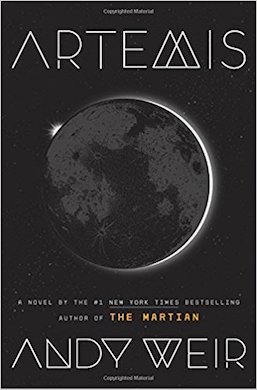
Artemis is a science-fiction novel centering around a woman named Jazz, a smuggler on the moon. But the moon colony’s still in its early decades, still struggling with internal conflict as the city of Artemis collectively decides what type of society it will be. When Jazz agrees to a heist in exchange for a large sum of money, she finds herself embroiled in a complex web of lies, crime, and power struggles which will define Artemis for centuries.
Artemis is Andy Weir’s second novel, but it was the third one that I read. I started with The Martian and then discovered Project Hail Mary, both of which also involved resourceful characters trying to survive in space/on other celestial bodies. That’s the basis for all of Weir’s novels, but it really, really works, so I don’t mind the similarities. Both The Martian and Project Hail Mary have received widespread critical acclaim, but Artemis was met with more mixed reviews. Don’t get me wrong, it certainly won awards, but most people seemed to see it as Weir’s weakest novel. So, I never read it until I was stuck at an airport and decided, hey, that’s fitting. A plane’s kind of like a spaceship, right? Right? Anybody?
Moving on.
The Science of Artemis
Artemis is a hard sci-fi novel. Its basis is in scientific and technological principles and it attempts to project a theoretically possible, though entertaining, future. It also explains a lot of these concepts throughout the novel, working them into the narrative. That’s not to say everything is 100% accurate in hard sci-fi, or even that it’s down-to-Earth—Artemis literally takes place on the moon, after all—just that real science plays a central role in the novel.
Soft sci-fi is much more hand-wavey and often includes impossibilities like psychic fields, superpowers, and absurd effects of radioactive materials. Most science-fiction exists along a spectrum. There are some hand-waves, some explanations, and some hand-waves with explanations that got edited out. Weir’s other two novels are the epitome of modern hard sci-fi. They are strongly science-based and assume that one of the reader’s main reasons for reading them is the science. Artemis is less science-focused than those two novels, but it still contains some very fun dives into the science of making and maintaining a space city like Artemis.
As Jazz is a smuggler, she’s very knowledgeable about the way Artemis works. Throughout the novel, she explains Artemis’s design and inner workings as she exploits them to make money and, eventually, to survive. This includes information about EVA (Extravehicular Activity) suits, airlocks (as with any Weir novel), filtration, civil engineering, and a lot of welding. I read a review for Artemis which complained about the amount of welding. Personally, I found the welding scenes (plural) to be interesting, but I’m also on a robotics team, so take that with a grain of salt. Other than engineering, physics, chemistry, and biology all come into play as well, especially during Artemis‘s climax. Yep, dramatic tension based on science, and it works.
Artemis a nerdy book. What can I say? I’m nerdy.
The…Social Science of Artemis?
While Artemis is certainly very science-based, I did mention that it was less obsessively scientific than The Martian or Project Hail Mary. It makes sense. All three novels are written in the first-person. The main characters in The Martian and Project Hail Mary are both scientists documenting their scientific efforts. Jazz, while certainly a brilliant engineer, is a smuggler who is narrating a heist story.
So, along with its scientific aspects, Artemis is also filled with political and social science. The city of Artemis is a complex place, with people from all around the globe and incredibly unique circumstances—circumstances which are unusual in far more than location. I wouldn’t say Artemis is a social commentary. It doesn’t really have a moral in that sense. It’s not saying that something is bad or good and its purpose isn’t to fully discuss the effects of a society. Instead, it discusses the very mechanisms of society, weaving them into the story in the same way it uses, say, engineering or chemistry. It’s not truly political either; instead, the science part of political science is emphasized. Weir even includes an explanation at the back of the book about how the city of Artemis works and why exactly it would develop that way.
I didn’t expect to be reading such a scientific analysis of society, or any analysis of society at all. It was interesting, but I preferred the sole science focus of Weir’s other books. Although I do enjoy “soft sciences” like sociology, the decrease in emphasis on hard science made the book less enjoyable to me.
But does this make Artemis worse than Weir’s other novels? No, I don’t think so. It really depends on who’s reading it—and it’s something that you have to judge for yourself.
Jazz’s Portrayal
In general, I thought that the main character was very entertaining and interesting. Her personality is very different from mine, but I thought that she was focused and realistic in a way that was engaging rather than tiring. That type of personality is difficult to get right, but in my opinion, Weir got it right. Jazz’s grapples for every advantage she can get as she attempts to complete the heist and escape with her life, and she’s really, really good at it. That’s always very fascinating to read.
I didn’t like the way that Weir wrote her femininity. Believe me, I’ve seen many much worse attempts by male authors to write female characters, so I was definitely still able to enjoy the book. However, I think this does have to be said. The writing doesn’t capture how women talk about their womanhood. And every woman talks about it differently, but whenever Jazz mentioned that she was a woman—and she mentioned it a whole lot more than the main characters of Weir’s other novels mentioned they were men—it was painfully obvious to me (and it would have been even if I didn’t know who Andy Weir was) that the author was male.
It’s a difficult thing to get right. On the one hand, Jazz is interacting with her society and she also is the product of that society. Of course she’s going to talk about herself somewhat differently, and of course her gender’s going to come up more than two lone guys stranded in space. On the other hand, Weir chose to write the society this way. He could have written it a way in which Jazz’s gender was mentioned less and solved this problem. I don’t think it’s reasonable to say that men should never write women as main characters. However, when those characters start talking about being women it can be pretty jarring.
Jazz is also Saudi Arabian and was raised Muslim, but she was written by a white guy. I can’t personally comment on the accuracy of the portrayal, but that’s something to consider as well.
To Read or Not to Read
Overall, despite not enjoying it as much as Weir’s other novels, I did like Artemis. In fact, I liked it enough to read the entire thing in one sitting. I even dropped half of my really bad airport bagel trying to hold my place in the book. It has an interesting plot with an interesting premise, STEM, and surprisingly-engaging interpersonal relationships. Artemis is not just a vehicle for science or social science, even though both of those are essential to the novel. Instead, it is, first and foremost, a story.
Artemis one of the best books I’ve read or started reading this past year, and certainly the best book I’ve read so far in 2023. Now that I’ve read Artemis, I’m itching for more sci-fi books, so I’ll be stopping by my library soon!
I’d recommend Artemis to anyone searching for a science-fiction novel with entertaining and factual science and engineering that isn’t solely focused on those aspects. If you’ve enjoyed Andy Weir’s other writing, then I think you’ll enjoy this too. And if you haven’t read anything else by him, please, please read The Martian.
